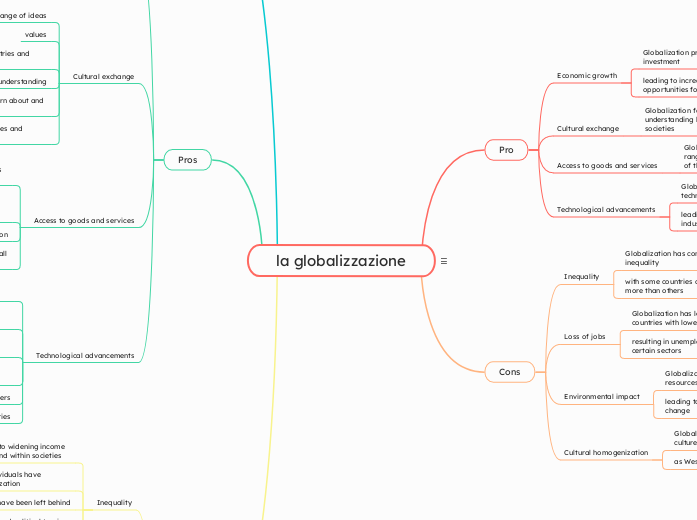la globalizzazione
Pro
Economic growth
Globalization promotes international trade and investment
leading to increased economic growth and opportunities for businesses
Cultural exchange
Globalization facilitates cultural exchange and understanding between different countries and societies
Access to goods and services
Globalization allows people to access a wider range of goods and services from different parts of the world
Technological advancements
Globalization promotes the sharing of technological advancements
leading to innovation and progress in various industries
Cons
Inequality
Globalization has contributed to widening income inequality
with some countries and individuals benefiting more than others
Loss of jobs
Globalization has led to the outsourcing of jobs to countries with lower labor costs
resulting in unemployment and job insecurity in certain sectors
Environmental impact
Globalization has increased the demand for resources and energy
leading to environmental degradation and climate change
Cultural homogenization
Globalization can lead to the erosion of local cultures and traditions
as Western culture and values become dominant
Breakdown of arguments
Pros
Economic growth
Globalization has led to increased international trade and investment
which stimulates economic growth
This is beneficial for businesses as it allows them to expand into new markets and access a larger customer base
It also leads to the creation of jobs and increased prosperity in many countries
Cultural exchange
Globalization facilitates the exchange of ideas
values
and traditions between different countries and societies
This promotes cultural diversity and understanding
as people have the opportunity to learn about and appreciate different cultures
It also helps to break down stereotypes and prejudices
Access to goods and services
Globalization allows people to access a wider range of goods and services from different parts of the world
This provides consumers with more choices and can lead to improvements in the quality and affordability of products
It also promotes competition
which can drive innovation and improve the overall efficiency of markets
Technological advancements
Globalization promotes the sharing of technological advancements between countries
This enables the transfer of knowledge and expertise
leading to innovation and progress in various industries
It also facilitates collaboration and cooperation among scientists
researchers
and engineers from different countries
Cons
Inequality
Globalization has contributed to widening income inequality between countries and within societies
While some countries and individuals have benefited greatly from globalization
others have been left behind
This can lead to social and political tensions
as well as increased poverty and disparities in access to basic needs and services
Loss of jobs
Globalization has led to the outsourcing of jobs to countries with lower labor costs
This has resulted in unemployment and job insecurity
particularly in industries that have been heavily affected by international competition
It can also lead to the exploitation of workers in developing countries
where labor standards may be lower
Environmental impact
Globalization has increased the demand for resources and energy
leading to environmental degradation and climate change
The transportation of goods over long distances contributes to carbon emissions and pollution
Additionally
the pursuit of economic growth and profit often comes at the expense of environmental sustainability
as companies prioritize short-term gains over long-term environmental concerns
